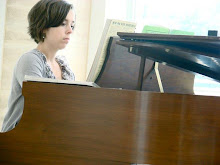Why has it taken me so long to write about the G minor sonata? When one thinks Schumann, I'm willing to bet that he/she does not think "piano sonata." The sonatas are just not his best works. Even our own beloved professor said that Schumann's best pieces were those that are not entitled "sonata." I don't find the G minor sonata as inspiring as the other pieces by Schumann that we have studied.
I can't discredit it altogether though. I imagine the first movement must be fun to play. One of those pieces that just feels good in the hands. That's one reason why I love playing Schumann. I think that his music, although it's not as pianistic as Chopin for instance, just physically feels good to play.
The second movement is beautiful. The melody successfully conveys the "Autumn" reference, a song on which this movement is based. The third movement is an energy-filled scherzo ("Beethovenian energy"). Schumann seems to explore the range of the keyboard more than usual in this movement.
Perhaps it's just the last movement that I struggle with. It is an impetuous perpetual motion movement, which usually I can appreciate, but for some reason I am less than impressed with this one. Aside from the brief moments of contrast provided by the lyrical sections, there is not enough variation to hold my interest. Seems like a beast to perform.
Thursday, January 24, 2008
Monday, January 21, 2008
Schumann Fantasie
Writing a post about the Schumann Fantasie is a bit more difficult for me than writing about the other Schumann pieces we have studied in piano lit. Part of the reason for this is that I am less familiar with it than I am with such pieces as Carnaval and Papillons, but also something about the Fantasie is inherently confusing to me. I just don't grasp it as easily as I do the others. I thought at first maybe this was due to a lack of continuity, but it is no more lacking than his other pieces. And he does achieve continuity through repetition, if nothing else (probably A-G-F-E-D, reference to Clara, too).
I think that there are certain qualities to the piece that make the Fantasie less tangible to me than others. While listening I subconsciously was thinking of it as a sonata and thought to myself, "Why did he not reverse movements 2 and 3?" Even though it is labeled as a fantasy, it does have some sonata-like characteristics (three movements, repeating themes and motives, etc.) Clearly the key areas could not have been switched since the 2nd movement is in Eb, but aside from that, the 2nd movement to me seems like a grand finale in the wrong place. I love the chordal theme of this movement - it is the Schumann whom we all know and love. The energy of this movement is appropriate to that of a finale, and the 3rd movement would serve well in the middle - a vocal melody with accompaniment.
After listening, I do not get the sense that this is a deep lament for Clara. For starters, it's in C major! Not exactly the key that I would have chosen as a lament. Clara's secret theme, though, is in D minor. Since Schumann intended to hide this reference to her, perhaps he also decided to mask his true feelings inside this minor motive within a major movement?
On a side note, Arnaldo Cohen's recording of this piece is awesome. It's so exciting, and I love how he is able to follow every single line. This piece is all about layering, textures, and counter-melodies, and Cohen brings out the different lines so beautifully. It's not over-done, if you know what I mean. Not too much attention to detail, but just enough so that the audience can notice all of the intricacies of the music.
I have come to love Schumann and want to play more of this music, but I think that I'll leave this one alone for a while.
I think that there are certain qualities to the piece that make the Fantasie less tangible to me than others. While listening I subconsciously was thinking of it as a sonata and thought to myself, "Why did he not reverse movements 2 and 3?" Even though it is labeled as a fantasy, it does have some sonata-like characteristics (three movements, repeating themes and motives, etc.) Clearly the key areas could not have been switched since the 2nd movement is in Eb, but aside from that, the 2nd movement to me seems like a grand finale in the wrong place. I love the chordal theme of this movement - it is the Schumann whom we all know and love. The energy of this movement is appropriate to that of a finale, and the 3rd movement would serve well in the middle - a vocal melody with accompaniment.
After listening, I do not get the sense that this is a deep lament for Clara. For starters, it's in C major! Not exactly the key that I would have chosen as a lament. Clara's secret theme, though, is in D minor. Since Schumann intended to hide this reference to her, perhaps he also decided to mask his true feelings inside this minor motive within a major movement?
On a side note, Arnaldo Cohen's recording of this piece is awesome. It's so exciting, and I love how he is able to follow every single line. This piece is all about layering, textures, and counter-melodies, and Cohen brings out the different lines so beautifully. It's not over-done, if you know what I mean. Not too much attention to detail, but just enough so that the audience can notice all of the intricacies of the music.
I have come to love Schumann and want to play more of this music, but I think that I'll leave this one alone for a while.
Subscribe to:
Comments (Atom)
